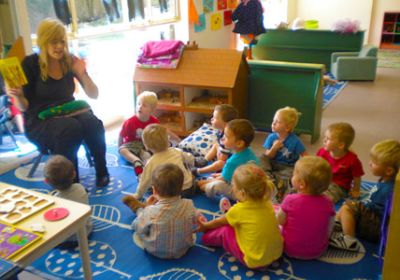
-
 New mothers will be pushed to return to work sooner and non-working families will be punished by having childcare subsidies reduced in the government’s latest budget. Treasurer Joe Hockey chose Mother's Day on May 10 to announce that almost 80,000 women will have their existing paid parental leave slashed, saving $1 billion. At the moment the government provides 18 weeks of paid parental leave at the minimum wage of $600 a week.
New mothers will be pushed to return to work sooner and non-working families will be punished by having childcare subsidies reduced in the government’s latest budget. Treasurer Joe Hockey chose Mother's Day on May 10 to announce that almost 80,000 women will have their existing paid parental leave slashed, saving $1 billion. At the moment the government provides 18 weeks of paid parental leave at the minimum wage of $600 a week. -
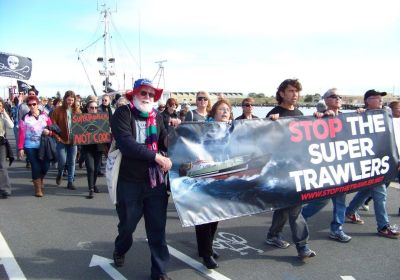
About 100 people rallied against the Geelong Star super trawler in Adelaide on April 26. The crowd gathered at Port Adelaide to oppose the 95-metre long factory ship which protesters say will hurt recreational fishing and damage the marine environment.
-
 Four Jobs for Women leaders in front of the steelworks in the early 1980s. Photo: Jobs for Women Facebook
In Wollongong in the early 1980s, jobs for women were scarce. They either had to wake at dawn to travel to Sydney on the diesel train or they sewed in backyard sweatshops for minimal wages.
Four Jobs for Women leaders in front of the steelworks in the early 1980s. Photo: Jobs for Women Facebook
In Wollongong in the early 1980s, jobs for women were scarce. They either had to wake at dawn to travel to Sydney on the diesel train or they sewed in backyard sweatshops for minimal wages.
-
 Federal education minister Christopher Pyne has given $4 million to Danish climate sceptic Bjørn Lomborg to set up the Australian Consensus Centre at the University of Western Australia. Lomborg is a well-known climate policy sceptic and the director of the Copenhagen Consensus Center, whose funding was cut by the Danish government in 2012.
Federal education minister Christopher Pyne has given $4 million to Danish climate sceptic Bjørn Lomborg to set up the Australian Consensus Centre at the University of Western Australia. Lomborg is a well-known climate policy sceptic and the director of the Copenhagen Consensus Center, whose funding was cut by the Danish government in 2012. -
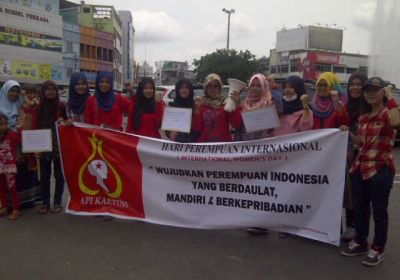 A new group has been established to campaign for women’s rights in Indonesia. In December, more than 100 women met in Jakarta to launch Indonesian Women’s Action – Kartini (API-K), which has begun campaigning for women’s rights in the workplace, home and society. Participants came from 32 cities across Indonesia. They included women who are involved in existing women’s networks, students, workers and urban poor. They spent three days discussing issues facing women in economics, politics and culture.
A new group has been established to campaign for women’s rights in Indonesia. In December, more than 100 women met in Jakarta to launch Indonesian Women’s Action – Kartini (API-K), which has begun campaigning for women’s rights in the workplace, home and society. Participants came from 32 cities across Indonesia. They included women who are involved in existing women’s networks, students, workers and urban poor. They spent three days discussing issues facing women in economics, politics and culture. -
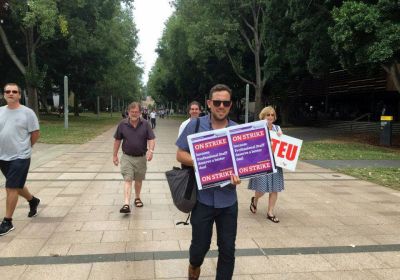 Staff at the University of NSW took industrial action on March 11 in response to stalled enterprise bargaining negotiations. The National Tertiary Education Union (NTEU) is seeking a pay rise of 3.5%, employment for Aboriginal and Torres Strait Islander people, and greater job security, including opportunities for permanence for casual staff, some of whom have been employed on a casual basis for many years. Classes were cancelled for the day and about 100 NTEU members and students picketed six gates around the campus.
Staff at the University of NSW took industrial action on March 11 in response to stalled enterprise bargaining negotiations. The National Tertiary Education Union (NTEU) is seeking a pay rise of 3.5%, employment for Aboriginal and Torres Strait Islander people, and greater job security, including opportunities for permanence for casual staff, some of whom have been employed on a casual basis for many years. Classes were cancelled for the day and about 100 NTEU members and students picketed six gates around the campus. -
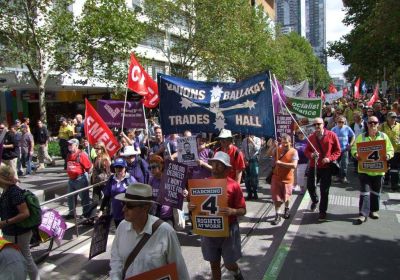 Thousands of people rallied around the country on March 4 to protest against the federal government’s anti-worker laws. Organised by the Australian Council of Trade Unions, the rallies protested against a range of government policies including cuts to wages and conditions, the deregulation of university fees, cuts to the ABC, and slashing unemployment benefits.
Thousands of people rallied around the country on March 4 to protest against the federal government’s anti-worker laws. Organised by the Australian Council of Trade Unions, the rallies protested against a range of government policies including cuts to wages and conditions, the deregulation of university fees, cuts to the ABC, and slashing unemployment benefits. -
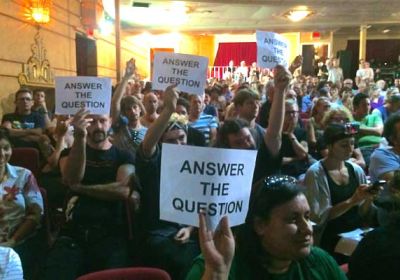 More than 1000 people attended a meeting at the Enmore theatre in Newtown on February 23 to hear from the builders of the $12 billion motorway WestConnex. The WestConnex Delivery Authority organised the meeting as a community consultation to answer what they call “misinformation” about the project. But they faced an overwhelmingly hostile reaction from the crowd. The crowd booed and heckled WestConnex Delivery Authority chief executive Dennis Cliche as he tried to promote the benefits of the motorway.
More than 1000 people attended a meeting at the Enmore theatre in Newtown on February 23 to hear from the builders of the $12 billion motorway WestConnex. The WestConnex Delivery Authority organised the meeting as a community consultation to answer what they call “misinformation” about the project. But they faced an overwhelmingly hostile reaction from the crowd. The crowd booed and heckled WestConnex Delivery Authority chief executive Dennis Cliche as he tried to promote the benefits of the motorway. -
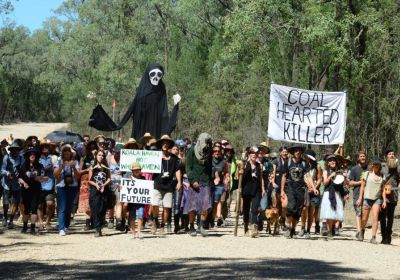
About 250 people gathered at the Leard State Forest in northern NSW from February 13 and 18 to stop Whitehaven Coal clearing the forest to make way for its proposed Maules Creek coalmine.
-
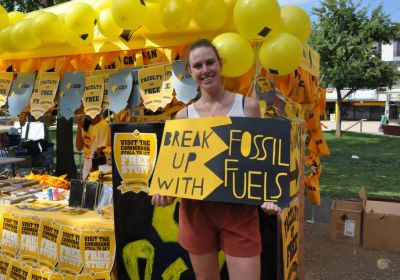 In the lead-up to the first global divestment day on February 14, the University of Sydney announced it will reduce the carbon footprint of its investments by 20% within three years by divesting from heavy polluters. But it has shied away from divesting from fossil fuels altogether. The decision follows a sustained student-led campaign, with support from Greenpeace, that has been urging the university to completely divest its investments in fossil fuels.
In the lead-up to the first global divestment day on February 14, the University of Sydney announced it will reduce the carbon footprint of its investments by 20% within three years by divesting from heavy polluters. But it has shied away from divesting from fossil fuels altogether. The decision follows a sustained student-led campaign, with support from Greenpeace, that has been urging the university to completely divest its investments in fossil fuels. -
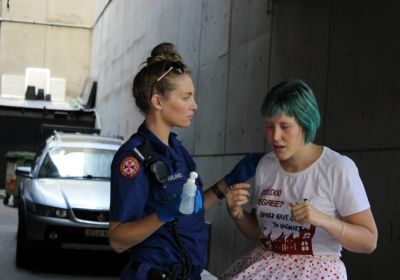
Police attacked students with pepper spray during a protest against university fee deregulation in Sydney on February 13. About 30 students gathered to protest against education minister Christopher Pyne, who was giving the Inaugural Hedley Beare Memorial Lecture at the Sydney Masonic Centre. He planned to “outline the Australian government’s achievements in schools since coming to office”. Police sprayed students to stop them entering the lecture to take part in an advertised Q&A with Pyne.
-
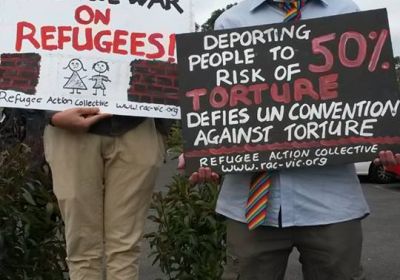 Update: An earlier version of this article reported that asylum seeker Puvaneethan reboarded the plane after protesting passengers had been removed. Reports have now confirmed he is now back in Maribyrnong detention centre in Melbourne. *** Three passengers were removed from a Qantas flight from Melbourne to Darwin this morning after refusing to take their seats in protest against the transfer of an asylum seeker on the same flight.
Update: An earlier version of this article reported that asylum seeker Puvaneethan reboarded the plane after protesting passengers had been removed. Reports have now confirmed he is now back in Maribyrnong detention centre in Melbourne. *** Three passengers were removed from a Qantas flight from Melbourne to Darwin this morning after refusing to take their seats in protest against the transfer of an asylum seeker on the same flight.